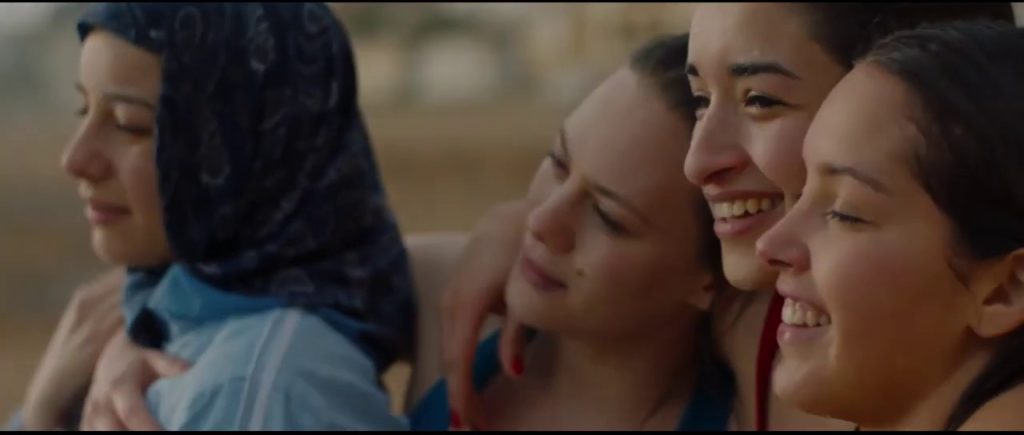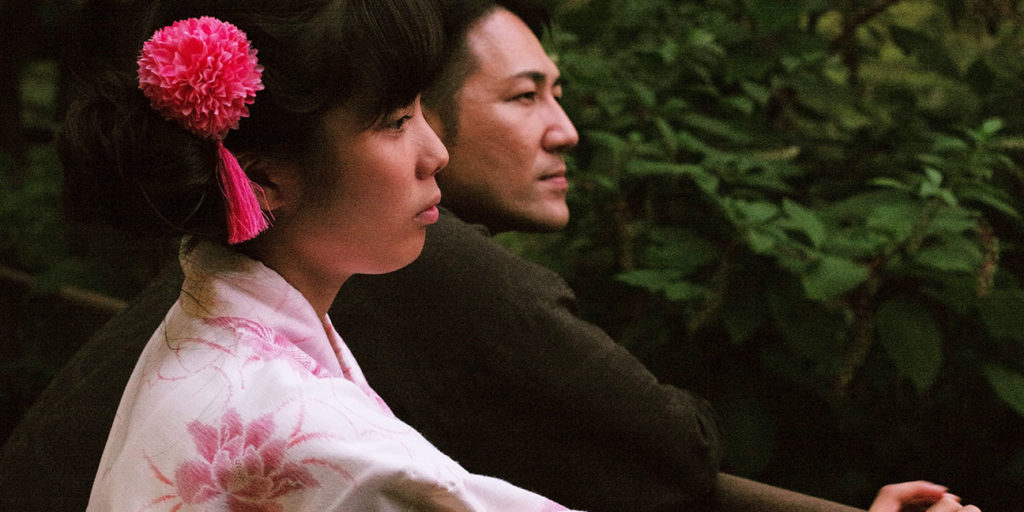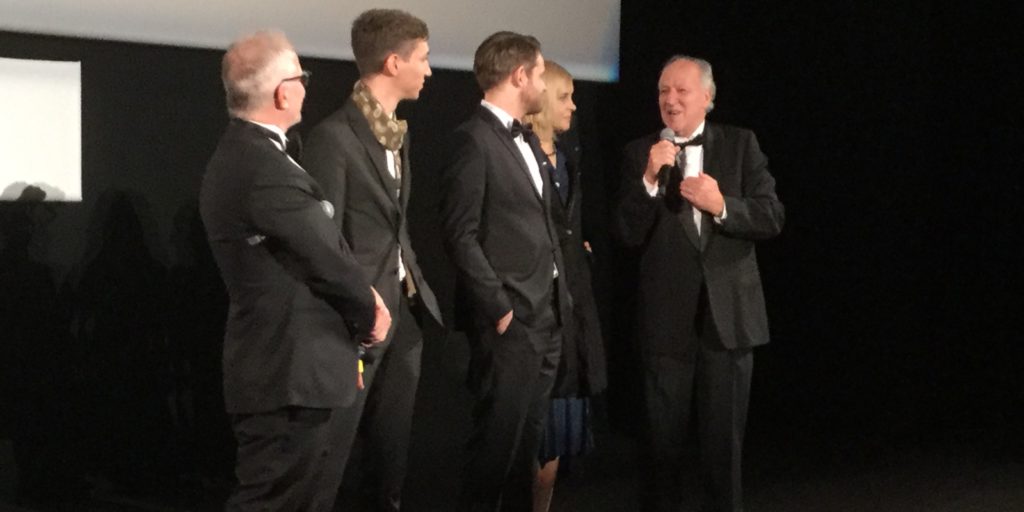It didn’t take very long for me to hit my hump day. After failing to get to bed before 1:00 in the morning, I knew that trying to catch the latest Pedro Almodóvar film only a few hours later would be my undoing. So I slept in and made my way back into the cloudy city of Cannes, now properly swarming with festival-goers and latecomers who had collected their accreditation and were in a hurry to orient themselves to what screenings they could catch. If the grim, gray weather caused all of us to quicken our pace, then any hope for comfort in the films I ended up catching would remain unmet. If anything, both of these films, though not without their moments of levity, contended with deeply serious subject matters concerning that which threatens to keep us as a species isolated from one another. From Algeria to Japan, cultural and social morays were questioned, the former by one who lived there and the latter by an outsider, to fascinating effect.
Papicha

In a year for Cannes where there were a number of films about the creative expression of women, Papicha is arguably the most roughshod. This is partially by design, as Mounia Meddour’s directorial debut fully embraces a realist aesthetic which dives into prolonged shots of handheld camerawork which are often close-up shots of the faces of her characters. Yet her assured work with actors doesn’t always intersect harmoniously with her script, and the film’s stabs of melodramatic incident can be misjudged as often as they are powerful. But for a film whose bigger picture may not be perfectly constructed, it is one which derives a great deal of importance from the interactions between its characters. In these instances Papicha is an often raw, emotionally astute look at the way culture and art operate under the shroud of fundamentalism, particularly for girls transitioning into womanhood.
The film’s core cast of characters are students of an all-girls school in Algeria during the civil war of the 1990s, most prominent of whom is Nedjma (Lyna Khoudri). She is an independent, fiercely outspoken young woman training to be a dressmaker who also tends to sneak outside of the flimsy confines of the school’s chain-link fence after curfew. We bear witness to one of these excursions in the film’s opening scene as she and her friend Wassila (Shirine Boutella) sneak off to spend their night at a dance club. Their playful banter and ebullient energy, which aggravates their anxious cab driver, is tempered by the heiks they keep at the ready. Indeed, these garments come to use when they are stopped by an armed, scowling militia. Meddour swiftly establishes these twinning threads of youthful energy and the encroaching oppression of the outside world, a dichotomy which only intensifies as the film progresses.
A sense of listlessness takes root in Nedjma as the reality of the outside world impedes her zest and artistic zeal. “Brain dead and easy money,” she succinctly summarizes the “Algerian Dream” to be, with her initial assessment of the country being akin to “a waiting room” for medicine, love, really anything. In the film’s strongest moments, Meddour entrusts her actors to convey these attitudes of discontent which may be rooted in archetypes yet nevertheless transcend simplistic caricature. The girls even grapple with the prescriptive roles they are in danger of fulfilling; Samira (Amira Hilda Douaouda), Nedjma’s roommate, is gently mocked by her friends as dedicating her studies toward receiving a doctorate in “home cleaning.” Yet when she becomes pregnant with the child of a man who is not her betrothed, Samira finds herself, much like the other women in the film, caught in a torpor of uncertainty in her relation to the dominant social order.
One of the most successful elements of Papicha is the way it taps into cultural specificity while cannily avoiding a thesis which fully embraces either conservative tradition or the persistent legacy of colonialism. The film’s soundtrack is littered with European music, including a cut from Vivaldi’s Il Giustino during a dressmaking montage, but the girls also sing traditional Arabic songs in their dorm rooms, ululating in unfettered joy which provokes the figures of fundamentalism who populate the film, not least of which include a mob of angry women who burst into the school and physically assault the students and some of the staff for their purported blasphemy. But as Nedjma observes, it isn’t provocation but indifference which kills many of the innocent women in her country, including her older sister Linda (Meryem Medjkane), who is brutally shot in cold blood by a teenage girl right outside of their home. It is her murder which inspires Nedjma to stage a fashion show at the school, one whose very existence is rife with both excitement and apprehension.

The film, as the opening title card informs us, is “freely inspired by real events.” Meddour indeed grew up in Algeria during the “Black Decade” and had directed several documentaries before writing and directing her first fiction film. The subsequent result is one which is informed specifically by dual realities which her characters navigate; an exterior one where they are called the name of the film, which is a derogatory name for “sweetheart”, and an interior one completely beyond the watchful gaze of men. Every man in the film is inextricably linked to a role of oppressor, including most interestingly Nedjma’s boyfriend Mehdi (Yasin Houicha). He offers a route of escape from Algeria but inadvertently reinforces constrictive demands which are symptomatic of patriarchal ideology. The film doesn’t vilify him as strongly as it does some of the other men, but rather regards his inability for self-awareness as an ultimately tragic one.
If Meddour’s recounting of her youth bears a degree of personal urgency, it also emphasizes some of the missteps of her script. While the violence of the film is treated without embellishment, it is unfortunately utilized in a wholly fabricated climax that verges on sensationalism, even as it strives to remain rooted in some semblance of reality. The political fury of Meddour is not misplaced, but her explicit manipulation of her audience may very well be. Yet the redeeming quality of Papicha is when it successfully portrays the intersection of cultural, gendered, and artistic identity with casual honesty. When Meddour derives these moments from the natural rapport among her extraordinary cast and not from the machinations of her script, the film has genuine moments of tender heft that linger.
Family Romance, LLC

Yasujirō Ozu, the great Japanese filmmaker known for his austere family dramas, died in 1963, the same year Jun-ichi Nishizawa proposed the use of fiber-optic communications at Tohoku University. These seemingly disparate figures and events of Japan’s cultural history may seem a bizarre association to make, but Nishizawa had been producing innovations in optical communication as early as 1950 with the PIN photodiode. During that decade, Ozu produced his most prolific body of work, including Tokyo Story and Floating Weeds. Yet in his lucid regard for the inherent march of modernity into the lives of his fellow countrymen, Ozu gently incorporated technology in late-period films like An Autumn Afternoon and, most famously, Good Morning, the latter of which concerned two boys who take a vow of silence they will only break if their parents buy them a television set. Near the end of his life, even Ozu must have had some inkling of the impending prevalence technology would have within the cultural consciousness of Japan, and one can only speculate on what his thoughts would be on the matter had he lived to witness the economic boom of the succeeding decades.
This is all to say that, were he alive today, it is entirely possible a contemporary film by Ozu would look something like Family Romance, LLC. This film is the latest brain child of another auteur, the German filmmaker and icon Werner Herzog. The self-proclaimed “soldier of cinema” has long bemoaned the encroaching presence of technology within our psychic and creative capacity for image-making, once going so far as to besmirch the skyline of Tokyo as one which did not permit the discovery of “anything pure in this decaying landscape.” He made these remarks in an interview for Wim Wenders’ Tokyo-ga, itself a documentary that was part travelogue and part homage to Ozu. But if Herzog’s skepticism has not abated, there is certainly something far gentler in Family Romance, LLC. Without repenting the scathing levels of satire in his previous rumination on technology, Lo and Behold, Reveries of the Connected World, Herzog nevertheless has made a film about a father and daughter that is as poignant as it is pessimistic, one which forgoes a traditional plot in favor of comic and caustic observations.
Shot predominantly with iPhone cameras, the film opens with the reunion of a man and the teenage daughter he hasn’t seen in a decade. Their conversation is mostly one-sided; he genially inquires about how she is, confessing that he held the desire to contact her every day since he and her mother divorced. The girl, named Mahiro (Mahiro Tamimoto), remains mostly reticent, her face hidden in a mane of hair that is ensconced within a black devil hoodie. He seems to strike upon some sort of breakthrough by taking selfies with her in front of cherry blossoms. These moments, with Herzog’s overexposed backlighting lending the human interactions a degree of frail tactility, contrast sharply to the sleek aerial drone footage of Tokyo’s parks and skyscrapers shot by his son, Simon Herzog.
This contrast between the aesthetically appealing and the flawed messiness of human reality is deepened by the film’s early revelation that Mahiro’s father isn’t, in fact, her father at all. His name is Ishii (played by a man named Yuichi Ishii, in fact) and he is the head of the eponymous company which specializes in providing substitute figures for most occasions, the most righteously funny of which is a wedding which reequires a replacement for the father of the bride after he has fallen ill (re: is too drunk to attend). In an official endorsement the company couldn’t have improved upon, the bride gushes, “I’m so glad we rented a father!” That this company actually exists and Ishii himself has impersonated certain roles for as long as eight years adds a troubling wrinkle to a film which is already concerned with truth and fiction.
This service provides some emotional value as when Mahiro finally hugs her father in the very same observatory Herzog was interviewed by Wenders. Yet there is also a queasy ambivalence about how much intimacy Ishii is privileged to when he speaks with Mahiro about matters concerning heartbreak or other important moments in her young life. But Herzog also performs a sleight of hand with the way Mahiro operates in a performative manner, as is indicated in the picture she shows Ishii of her at a beach in Bali. When he realizes that she took that picture at a local beach, Issi declares with a humbled sense of understanding, “‘We’re both lying to each other, and that’s that.”
The act of role-playing is characterized as being intrinsic to Japanese culture, as Herzog indicates in a sequence where Ishii speaks with a woman about the spirit of the fox which “has the power to alter reality.” Yet in a broader sense this altered reality is inescapable in the modern age of alternative facts. Take note of when another client asks Ishii and several of his colleagues to pose as “nerds” photographing her in a public space for the expressed purpose of giving off the air of being a celebrity. It does the trick, for several gullible men stop to pose with her. I’m certain the irony of this film playing at a festival where countless attendees take selfies on the red carpet during morning screenings is not lost on Herzog, who was in tremendous spirits at its evening premiere.

Yet the film’s humor cannot mask an existential angst which courses throughout. A trip to a hotel which specializes in robotic clerks and has an aquarium full of robotic fish lingers on the lurid plasticity of these creations. There is even a brief sojourn to a company which, in its own words, offers a service to those “seeking the experience of being dead without dying” by having staged funerals. As Ishii lays in a coffin, one which is slightly too small for him, he remarks how quiet the inside is. “In your grave, it’s all silence,” replies the caretaker. The immutability of mortality hovers over the film, and a moment where a woman reliving her winning a 20 million yen prize at her door is belied by a smash cut to a close-up of a hamster running in its wheel. In our self-imposed visions of happiness, we are all ultimately just wasting time, Herzog seems to say.
In this respect, Family Romance, LLC shares a melancholic lineage with Ozu as much as it dispels the idealistic aims of communication pioneered by Nishizawa. It may, in its emphasis on anthropological commentary over measured narrative, lack the emotional devastation of a work like Tokyo Story, and there are moments where the film reiterates several talking points from Lo and Behold. But if the famous exchange from that film about the disappointment of life can be applied here, that disappointment can only be brought to you, Herzog grimly growls, by a corporate sponsor. If that isn’t an original message, it still bears unusual resonance from one of cinema’s great iconoclasts.
Coming Up Next:
Two crime films from China and Romania, both in competition, and the first film from Costa Rica to ever play in Cannes.
